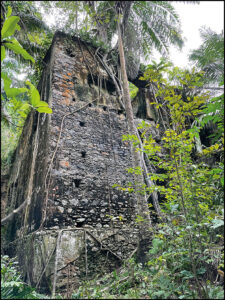 COLOGNE, GERMANY—According to a Live Science report, M. Dores Cruz of the University of Cologne and her colleagues have found early evidence for the practice of plantation slavery at Praia Melão, the recently identified site of a sixteenth-century sugar mill on the northeastern coast of the island of São Tomé. The Portuguese inhabited the island, which is located off the coast of West Africa in the Gulf of Guinea, in the late fifteenth century. They soon found, however, that migrants to the previously uninhabited island endured high rates of malaria. Convicts, Jewish children, and enslaved Africans were soon forced to work there, harvesting and processing sugar cane, and building and maintaining the sugar mills. Praia Melão includes a large stone two-story building with a clay roof. Its lower floor served as a sugar boiling room, while domestic quarters were placed on the upper floor. Fragments of cone-shaped sugar molds similar to those found at Portuguese sugar mills in Madeira have also been recovered at the site. By 1530, plantations on São Tomé were so profitable that additional sugar mills were constructed, but the Portuguese eventually moved much of their sugar production to Brazil in the early seventeenth century. Read the original scholarly article about this research in Antiquity.
COLOGNE, GERMANY—According to a Live Science report, M. Dores Cruz of the University of Cologne and her colleagues have found early evidence for the practice of plantation slavery at Praia Melão, the recently identified site of a sixteenth-century sugar mill on the northeastern coast of the island of São Tomé. The Portuguese inhabited the island, which is located off the coast of West Africa in the Gulf of Guinea, in the late fifteenth century. They soon found, however, that migrants to the previously uninhabited island endured high rates of malaria. Convicts, Jewish children, and enslaved Africans were soon forced to work there, harvesting and processing sugar cane, and building and maintaining the sugar mills. Praia Melão includes a large stone two-story building with a clay roof. Its lower floor served as a sugar boiling room, while domestic quarters were placed on the upper floor. Fragments of cone-shaped sugar molds similar to those found at Portuguese sugar mills in Madeira have also been recovered at the site. By 1530, plantations on São Tomé were so profitable that additional sugar mills were constructed, but the Portuguese eventually moved much of their sugar production to Brazil in the early seventeenth century. Read the original scholarly article about this research in Antiquity.















